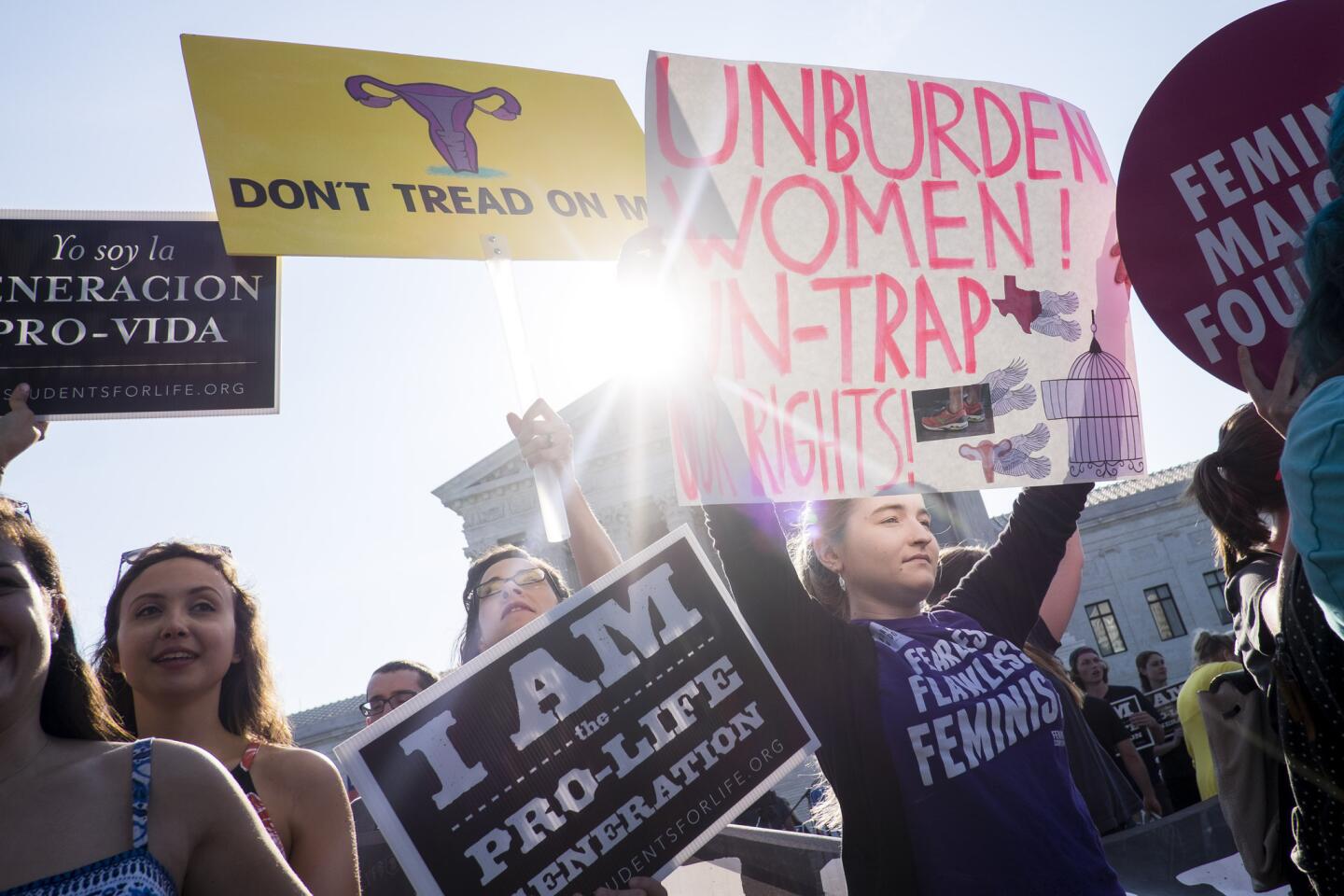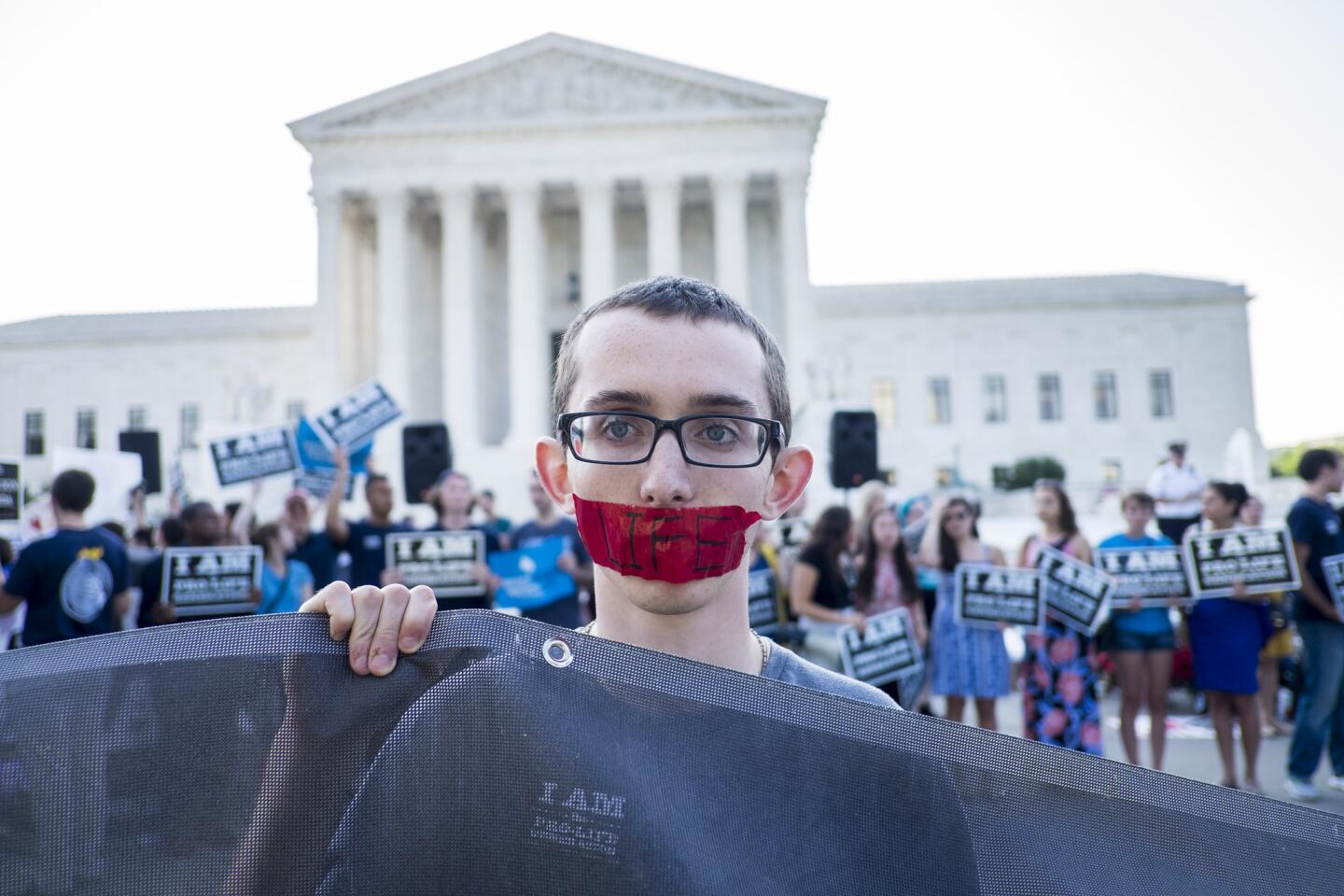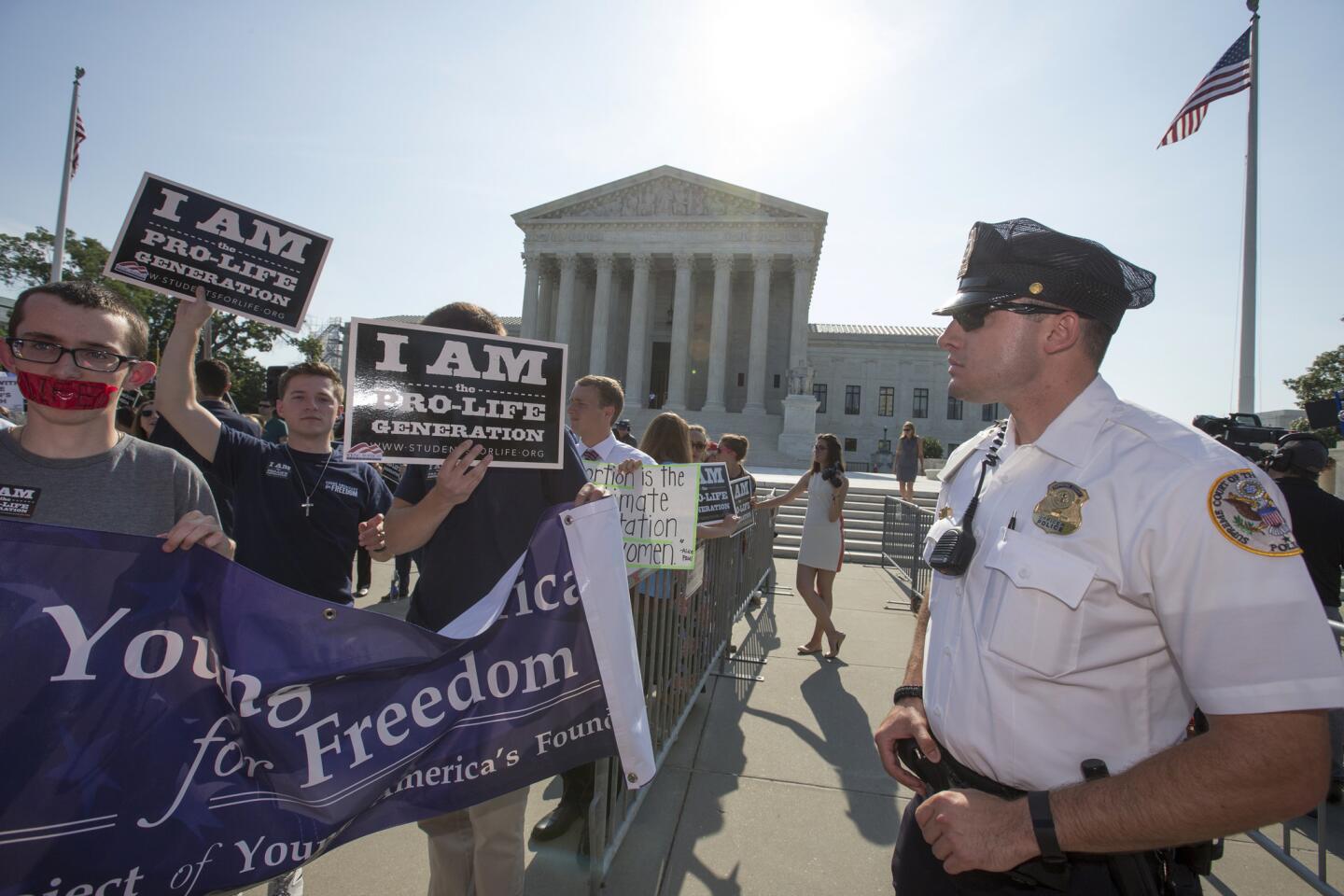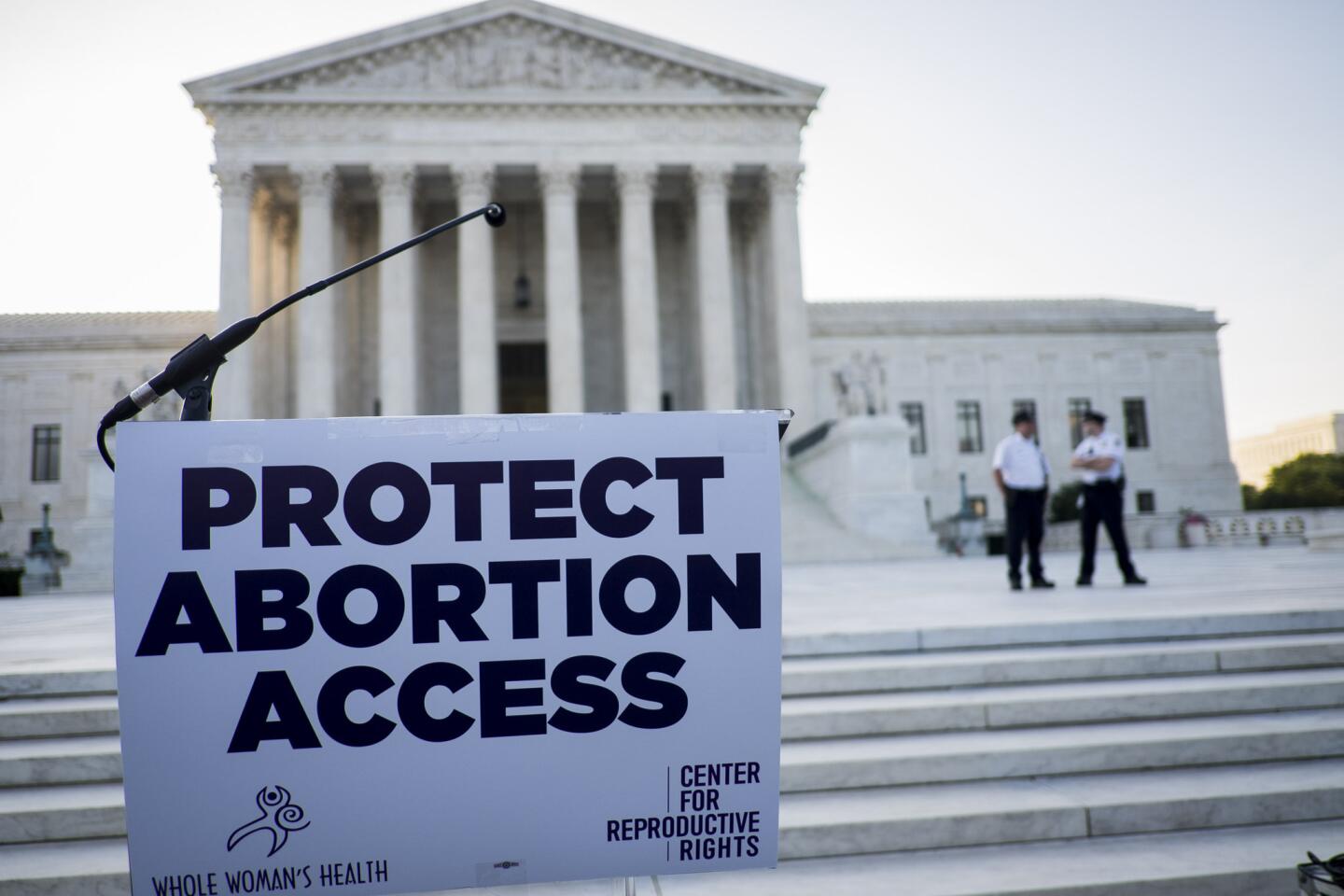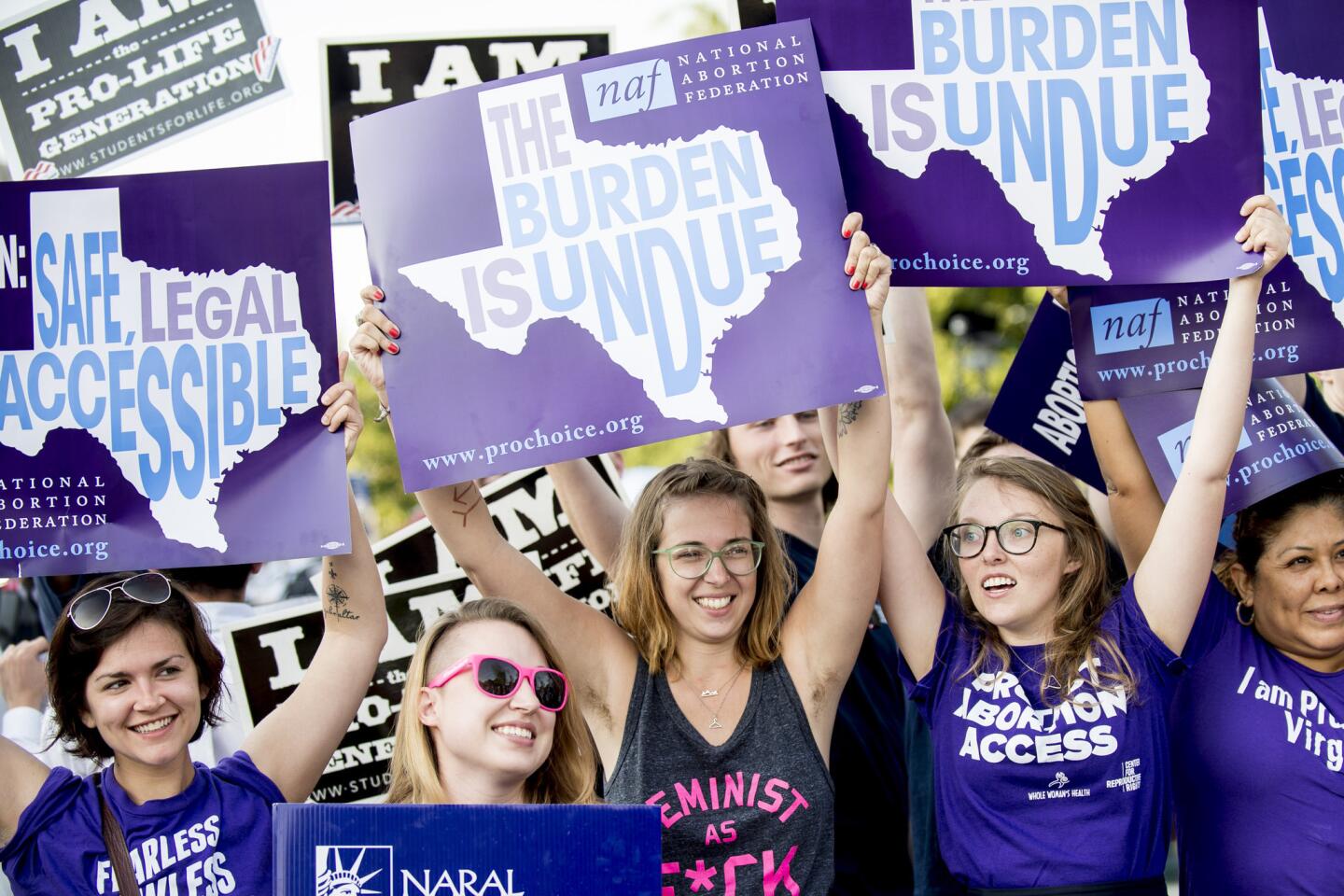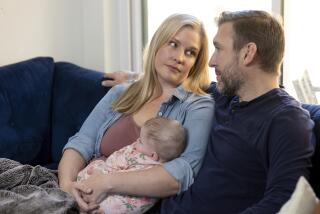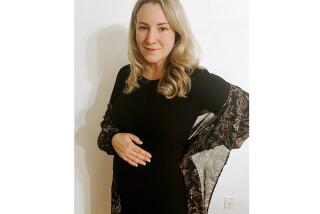Supreme Court strengthens right to abortion, strikes down Texas restrictions on clinics
The Supreme Court on Monday handed down its most significant abortion ruling since 1992, shielding doctors and clinics from unnecessary health regulations that could force them to stop offering the procedure.
The justices, by a 5-3 vote, reaffirmed their view that state lawmakers may not put an “undue burden” on women who seek an abortion and overturned a Texas law that would have closed three-fourths of the abortion clinics in that state.
The court’s opinion by Justice Stephen G. Breyer concluded the strict Texas regulations did little to protect the health of women while imposing significant obstacles for those who seek an abortion.
The ruling is likely to block or void similar laws in about two dozen other states.
It was second time in a week that a longstanding conservative social campaign ended in defeat at the high court. Last week, the justices rejected a plea to strike down affirmative action at colleges and universities. In both cases, Justice Anthony M. Kennedy joined with his liberal colleagues to form the majority.
Until Monday, it was unclear whether Kennedy, a moderate conservative, would tilt in favor of state regulation or the right to abortion. In 2007, Kennedy led conservatives in upholding a ban on “partial-birth” abortions and worried liberals by suggesting in his opinion that many women come to “regret” their decision.
Kennedy also cast the crucial fifth vote in Planned Parenthood vs. Casey in 1992, when the justices upheld the right to abortion established in Roe vs. Wade, but gave states more leeway to regulate the procedure as long as they did not impose an “undue burden” on women’s rights.
Since that decision did not clearly define what constitutes an “undue burden,” conservatives have been trying ever since to clarify how far states may go, in Kennedy’s mind, without crossing the line. Antiabortion lawmakers across the South and the Midwest adopted increasingly strict regulations in recent years which have forced many abortion facilities to close.
By siding with liberals Monday, Kennedy, the last sitting justice who signed the Casey decision, put judges on notice that he thinks the bar for “undue burden” is high.
The decision sends a clear warning to Republican-led states hoping to restrict abortion for political or religious reasons that the high court will not blindly accept a state legislature’s findings that restrictions are medically necessary without clear evidence.
Breyer said the state’s two major regulations cannot be justified on medical grounds. The 2013 Texas law required doctors performing abortions to have admitting privileges at nearby hospitals and clinics to meet the minimum standards of surgical centers.
The law forced about half of the state’s abortion clinics to close, and if fully implemented, would have reduced the number from 40 before 2013 to nine, located only in major metro areas like Dallas, Ft. Worth, Austin, Houston and San Antonio, abortion-rights groups said.
“We conclude that neither of these provisions offers medical benefits sufficient to justify the burdens upon access that each imposes,” Breyer wrote in Whole Woman’s Health vs. Hellderstedt. “Each places substantial obstacles in the path of women seeking a pre-viability abortion, each constitutes an undue burden on abortion access, and each violates the federal Constitution.”
Breyer noted that Texas appeared to be singling out abortions, rather than other procedures with a higher risk rate.
“Nationwide, childbirth is 14 times more likely than abortion to result in death,” Breyer said, “but Texas law allows a midwife to oversee childbirth in the patient’s own home. Colonoscopy, a procedure that typically takes place outside a hospital [or surgical center] setting, has a mortality rate 10 times higher than abortion.”
Texas would have required all abortions to take place in fully staffed, outpatient surgical centers, including women only seeking medication to end an early pregnancy. Since only nine such facilities are in operation in Texas, women from the western part of the state would have had to travel hundreds of miles to get to such a center.
The court also struck down the admitting-privileges provision. Many hospitals refuse to extend privileges to such doctors because of the controversy over abortion. Breyer said the state could not cite “a single instance” where a doctor’s admitting privileges at a local hospital would have led to better treatment for an abortion patient.
Breyer’s matter-of-fact opinion did not directly question the motives of Texas lawmakers who adopted House Bill 2. But Justice Ruth Bader Ginsburg spoke more directly in a short concurring opinion.
“It is beyond rational belief that H.B. 2 could genuinely protect the health of women,” she said. “Women in desperate circumstances may resort to unlicensed rogue practitioners...at great risk to their health and safety.”
Ginsburg, a longtime champion of abortion rights, said state laws that single out abortions should be invalidated.
“Targeted-regulation-of-abortion-provider laws like H.B. 2 that do little or nothing for health, but rather strew impediments to abortion … cannot survive judicial inspection,” she said.
Besides Kennedy and Ginsburg, Justices Sonia Sotomayor and Elena Kagan joined Breyer.

The Supreme Court , in a victory for abortion-rights advocates, limited the power of Texas and other states to restrict or effectively shut down clinics that offer the procedure.
Abortion-rights advocates said the ruling sends a clear warning to states attempting to restrict abortion.
“Without question, today’s ruling is a game-changer in what has been an unrelenting assault on women’s rights across the country,’’ said Nancy Northup, president of the Center for Reproductive Rights, which led the lawsuit on behalf of the clinics. “This tremendous victory renews the promise of Roe vs. Wade for the next generation. We will not stop fighting until access is restored for all women in the U.S.”
President Obama praised the ruling. “We remain strongly committed to the protection of women’s health, including protecting a woman’s access to safe, affordable healthcare and her right to determine her own future,’’ he said in a statement.
Antiabortion groups voiced outrage. “How shabby are these abortion clinics that they cannot meet the minimum standards other outpatient surgical centers are required to meet?” said Carol Tobias, president of National Right to Life. She said the court’s opinion may mark the return to the period immediately after the Roe vs. Wade decision when the court “exhibited extreme hostility to regulation of abortion as a medical procedure.”
“Today’s devastating news underscores the incredibly high stakes the Supreme Court vacancy hold for the unborn child,” added Rep. Chris Smith (R-N.J.), who chairs the congressional Pro-Life Caucus.
In dissent were Chief Justice John G. Roberts Jr. and Justices Clarence Thomas and Samuel A. Alito Jr.
Thomas said the “majority radically rewrites” the 1992 opinion in a way that will encourage judges to strike down reasonable regulations of abortion. Alito said it “seems clear that HB 2 was intended to force unsafe facilities to shut down,” citing the case of Kermit Gosnell, the Philadelphia abortion doctor who was convicted of murder in the death of three infants.
Breyer rebutted that comment, noting that Pennsylvania authorities had not inspected Gosnell’s shabby clinic for 15 years, while Texas inspects abortion facilities annually.
The ruling should allow some of Texas’ clinics to reopen, especially in rural areas, said Nan Kirkpatrick, executive director of the Dallas-based Texas Equal Access Fund, which helps those who cannot afford abortions.
“It’s vital in West Texas and the Panhandle, where people are hundreds of miles from care,” said Kirkpatrick. “We are really hoping this decision will reopen providers.”
More to Read
Start your day right
Sign up for Essential California for news, features and recommendations from the L.A. Times and beyond in your inbox six days a week.
You may occasionally receive promotional content from the Los Angeles Times.
